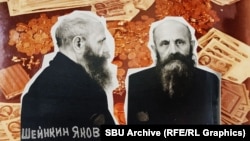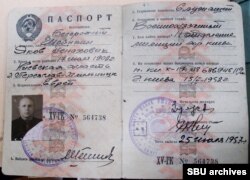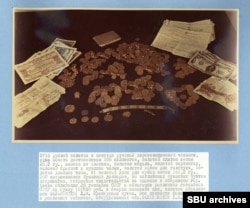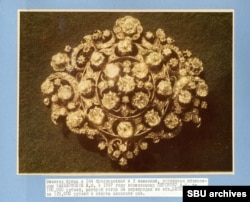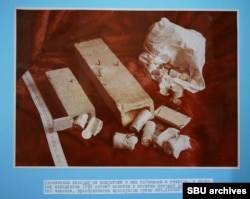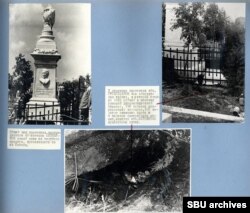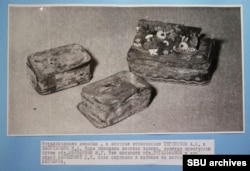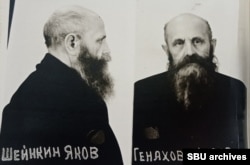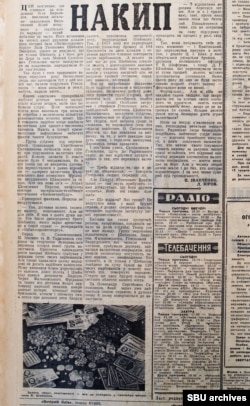A folder in Ukraine's KGB archive reveals the glittering wealth and shocking punishment dealt out to an allegedly corrupt fruit merchant in Kyiv.
In the early 1960s, the Soviet government under Nikita Khrushchev launched an all-out crusade against the black market. Underground traders were arrested with unprecedented zeal.
In the archive of the Security Service of Ukraine (SBU) in Kyiv in 2021, historian Eduard Andryushchenko discovered a folder detailing the arrest and eventual execution of one allegedly corrupt trader caught up in the crackdown.
From 1944 to 1954, Yakov Sheynkyn worked as a freight forwarder who regularly drove from his home in Kyiv to western Ukraine to pick up shipments of apples. According to the KGB file, he also bought apples for himself along the way -- around 9 tons at a time. Sheynkyn allegedly sold the fruit illegally through stores in Kyiv, apparently sharing the profits with store managers.
Later, Sheynkyn expanded his operation after landing a job overseeing a wholesale warehouse. There, he allegedly formed a black-market operation involving managers, salesmen, storekeepers, and truck drivers. According to the KGB, the scheme involved manipulating invoices to steal fruit including bananas and pineapples, which were rarities in the Soviet Union. The stolen fruit was then sold on by those involved in the scheme.
By the beginning of 1961, Sheynkyn had amassed a fortune estimated at 1,200,000 rubles, or around $300,000 at the official exchange rate. But the storekeeper remained discreet about his enormous wealth. Sheynkyn simply set aside savings -- largely in gold -- for his old age.
With the help of Abram Persion, a well-connected cousin, Sheynkyn also diversified his wealth by using rubles to purchase jewelry and expensive animal furs.
Sheynkyn’s most ostentatious purchase was a diamond-studded gold brooch. According to the KGB report on Sheynkyn, the storekeeper paid 125,000 rubles – the equivalent of 13 years’ salary for the average Soviet worker -- for the ornament.
In 1960, Sheynkyn apparently began to feel nervous about the literal piles of treasure stacking up in his apartment. He began handing out parcels of jewels and gold to relatives and friends to hide on his behalf, including his cousin Persion.
Sheynkyn was right to be uneasy. In February 1960, he was arrested, along with dozens of people allegedly linked to the black-market fruit operation. When the arrests hit the headlines of the Soviet press, those whom Sheynkyn had handed his gold followed the news with increasing dread.
With the KGB investigation into the Kyiv fruit network ongoing, guardians of Sheynkyn's treasures tried various ways to distance themselves from the gold and jewels they had been entrusted with.
Persion arrived at the home of Sheynkyn's adult daughter and her husband, Moses Gitelman, and dumped boxes of gold in their baby’s crib before striding out of the apartment, ignoring the protests of the couple. The panicked husband and wife then attempted to hide the gold in the grave of Yakov Sheynkyn’s wife.
In the spring and summer of 1962, Persion, Gitelman and several others who had allegedly received Sheynkyn’s treasures were arrested. In total, nearly 2,000 gold coins with a total weight of almost 12 kilograms, along with 600 grams of jewels, animal furs, and other valuables were seized from people involved in the Sheynkyn case.
In December 1962, 35 people allegedly involved in the fruit racket were in the dock. Sheynkyn was initially sentenced to 15 years in prison, plus three years of internal exile.
But the fruit merchant was doomed by timing. With Khrushchev seeking to make examples out of cases like his, the Supreme Soviet of the U.S.S.R. soon stepped in and decreed that the court was “permitted” to sentence Sheynkyn and others to death.
Another trial took place in April 1963 that resulted in harsher sentences for those involved. Persion received 12 years prison, Gitelman eight years, and Sheynkyn was sentenced to death.
Soon after the sentencing, the Soviet mouthpiece Vechirniy Kyiv ("Evening Kyiv") wrote a triumphalist propaganda article about the case under the headline “Scum.”
"Another dirty stain has been erased from the bright face of our city.... When dirt appears on the dishes, the hostess carefully cleans it off. Soviet people ruthlessly scrape off the smallest traces of dirt…”
The newspaper did not mention the extreme sentences handed down as a result of Khrushchev's intervention.
Sheynkyn appealed his punishment, but the petition was refused on May 22, 1963. Soon afterwards, he was shot dead.
With contributions from Amos Chapple in Prague




